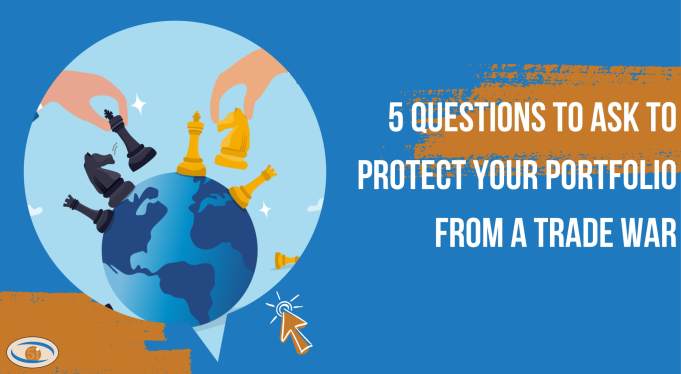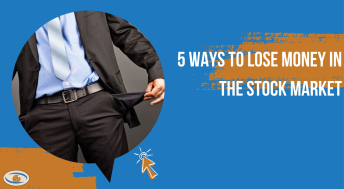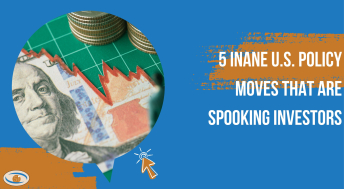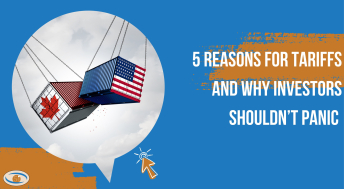With fears that Donald Trump's tariffs will hit the global economy, here's what to look for in the stocks you own
Well, no doubt you have watched your investment portfolio decline in value as the current trade war seemingly escalates on a daily basis. And we came close to a bear market before Donald Trump’s tariff reprieve announcement sent markets up again.
Also, no doubt you have seen headlines about the “looming” recession on the way. It’s no surprise, really. With tariffs adding to the cost of everything, but mostly due to uncertainty, consumers and businesses alike are just going to stop buying things. The trickle-down economic impact from lower spending will hurt nearly all businesses.
So, what’s an investor to do? Well, first, don’t panic. That should of course be Rule No. 1 in any sort of market event. Given the recent volatility index moves, should investors sell on the upswings in anticipation that things will get worse? But historically, when “everyone” is selling it is often a good time to buy.
We will leave that call to others this week. For now, let’s focus on what you can do to protect your own portfolio. Let’s examine five questions you should ask yourself, on each and every stock you currently own.
Is the company I own impacted by tariffs?
Obviously, based on recent events, this is the big question one needs to ask. Some companies, such as auto manufacturers, steel producers and metal fabricators, are far more affected than others, depending on the extent of their sales to the U.S. But some companies, such as Canadian firm Well Health Technologies Corp., have made announcements saying there will be little impact. Well on Feb. 3 noted “it has no exposure to U.S. tariffs” and “does not expect any material supply chain impacts to any of its operations.” This news, though, has not stopped a 32 per cent slide in its stock since then. Other companies, such as Canadian utilities, may see little impact from tariffs as well. Fortis Inc., for example is a regulated utility, providing electricity to customers in Canada, the U.S. and the Caribbean. While it has some U.S. business, in company press releases it has not mentioned the word “tariff” in 17 years (according to Bloomberg LP data). Its stock is up about 5 per cent this year, well ahead of markets in general. Take a close look at the companies you own to try to ascertain whether there is a cause to be worried about tariffs, or not.
How much debt does the company have?
It’s easier to understand how a company with no debt has a better ability to survive than a massively leveraged company. Balance sheet strength is important, always. But in a period of recession, when business and cash flow slow down, it becomes even more important. In a period of stagflation, where interest rates might rise even as the economy slows, balance sheet strength becomes even more crucial. The last thing you might want to own is a company laden with debt while rates move up. So take a look at the financial strength of the stocks you own. Obviously, a company with no debt and billions in cash on the books may be a safer bet than others. And, these companies do exist: a recent Bloomberg data screen notes 2,917 companies in North America with no debt at all.
How did my company do in the last recession?
There have been many more recent market events, such as COVID-19, the mini-crash of 2018, and market events of 2022. In Canada, the pandemic did cause an official recession for about 14 months. But because the market bounced so fast, we would prefer to look at the Great Recession of 2007 to 2009, including of course the financial crisis. This data can be hard to come by, but many, many companies still managed to grow their earnings during this period. Sure, their stocks still fell, but from a fundamental basis business continued and cash flow grew. Now, for those worried about recession, we would look to see how your companies performed in this historical period. Look at earnings, not stock prices. Pretty much every stock declined then, but the companies that could stay profitable were “safer” and their stocks tended to recover faster.
Does your company pay a dividend?
If so, what is the payout ratio? A dividend won’t always stop a stock from falling. Just look at BCE Inc. for confirmation of this. Its current yield is 13.4 per cent, but its stock is down 28 per cent in the past year. This, of course, is because investors fear it will cut its dividend. But for a stock paying a dividend that is not likely to be cut, the dividend can provide both a floor for a stock price, and ongoing income for investors who hold that stock throughout a recession. Secure dividends might lessen the pain of any continued market decline. When looking at stocks you own, take a look at their dividend history and, importantly, their payout ratio. A company that has paid dividends for 45 years and with a payout ratio of only 15 per cent is probably going to be secure. Note we said “secure” and not “safe,” as no dividend is guaranteed, ever.
How is the customer concentration?
Suppose you have found a company that sustains little impact from tariffs, survived the last recession relatively unscathed, has no debt, and pays a solid dividend and has a low payout ratio. Are you safe? Well maybe, but now you need to worry about other companies. In a recession, many companies experience sharp slowdowns. Some will not survive. If your “secure” company has 65 per cent of its business with another company, now you also need to worry about that other company. Companies with high levels of customer concentration are always riskier but in a recession that concentration risk becomes even more acute. Ideally, you want to own a company with no customer accounting for more than 10 per cent of its business.
Unlock the Power of Informed Investing with 5i Research!
DIY investing doesn't have to mean going it alone. At 5i Research, we're your trusted partner in navigating the stock market. Our platform offers comprehensive stock and market research, empowering you to make smart investment decisions.
- Investor Q&A: Have burning questions? Get answers from our team of experts and fellow investors in our dedicated Q&A section.
- Research Reports: With over 60 meticulously researched Canadian stocks, our reports offer in-depth analysis, giving you the confidence to invest wisely.
- Model Portfolios, Alerts, Forums, Portfolio Tracking, and Much More.
Take Care,







Comments
Login to post a comment.